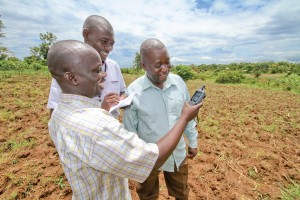What We’re Reading: One Data Report 2013, Part 2
Transparency Makes a Difference
Fiscal transparency and the quality of institutions play crucial roles in ensuring that government spending is effective and accountable. Transparency provides people with information they need to hold governments responsible for their use of public funds. Empowered with information, citizens can press governments to spend resources more responsibly – on investments in health services, agriculture and education, for instance – and monitor for misconduct and corruption. For this to happen, citizens must know how governments plan to use their money, how that money actually gets spent and what the outcomes are.

Asuman, left, measures his fields with a GPS device and help from Regional Agricultural Supervisor John Peter Emoi, center, and fellow farmer Joseph Mulandya.
At this point, transparent governance has replaced close monitoring as the most important factor in reaching the Millennium Development Goals. Transparency enables citizens to hold their leaders accountable and demand that resources are used for the benefit of all. This is why budget transparency by African governments and aid transparency by donors is vital. The report suggests that significant progress relies on fiscal transparency, and African governments should consider: (1) publishing all core budgetary documents (as tracked through the open Budget Index); (2) adopting the global principles of fiscal transparency recognized by the Global Initiative for Fiscal Transparency; (3) joining the open government partnership and applying a strong fiscal transparency action plan; (4) participating in the World Bank’s BooST program to increase the transparency of government spending; and (5) making data publicly available in open formats, in line with agreed standards, so that it can be compared, combined and used effectively.
What’s Working and What More Needs to Be Done
When looking at sub-Saharan African governments’ spending levels on health, education and agriculture over the past decade, there is a strong correlation between levels of spending and overall Millennium Development Goals (MDG) progress. On average, countries that have allocated a greater share of government expenditures in these sectors have achieved improved MDG-related results. Governments performing well against their MDGs should try to maintain their prioritization of spending in the health, agriculture and education. The Report suggests that efforts over the past decade are paying off. On the other hand, MDG stragglers should take steps to increase spending in these sectors in the future. While the ultimate budget allocation decisions must be determined according to country-by-country needs and political dynamics, there is an overall need to address the underinvestment in these key sectors.
The Role of Opportunity International
Organizations like Opportunity International play a significant role in reaching MDGs, especially in the health, education, and agriculture sectors. Opportunity’s Global Positioning System (GPS) plotting technology provides precise information about land, including plot boundaries, altitude and access to water for client Asuman Kyendakulya of Mayuge, Uganda. From this survey, Asuman can accurately gauge seed, fertilizer, and labor needs, as well as predict his sugarcane yield. This GPS mapping technology helps farmers plan and manage their farms, increasing efficiency and income. Where farms are often disjoint, knowing the exact acreage of their tillable land helps growers use the latest agricultural practices for maximum productivity and environmental sustainability while enabling Opportunity to make the right size loan.
As the international community continues to dust itself off from the financial crisis that halted numerous critical developmental programs, global observers should find it encouraging that developing countries have made great strides towards reaching the Millennium Developmental Goals established in 2000. Efforts by humanitarian advocates, such as Opportunity International, undoubtedly have had a net positive effect on countries poised to shed their “third-world” designations. Opportunity International programs like MicroEnsure and Financial Literacy ensure the future of women and children in Sub-Saharan Africa and around the globe. These programs, however, would not be possible without the generous efforts of donors. Thanks you for your support. We’ll continue to keep you up to date on our progress. In case you missed our first post on the ONE DATA Report, you can find it here.